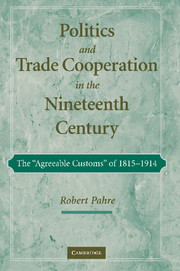Book contents
- Frontmatter
- Contents
- List of Figures
- List of Tables
- Preface
- POLITICS AND TRADE COOPERATION IN THE NINETEENTH CENTURY
- PART ONE COOPERATION AND VARIATION
- PART TWO DOMESTIC POLITICS AND TRADE POLICY
- PART THREE POLITICAL SUPPORT AND TRADE COOPERATION
- PART FOUR NORMS AND COOPERATION
- 10 The Most-Favored-Nation Norm
- 11 The Spread of the Trade Treaty Network
- 12 Clustering Negotiations in Time
- PART FIVE CONCLUSIONS
- References
- Index
12 - Clustering Negotiations in Time
Published online by Cambridge University Press: 08 December 2009
- Frontmatter
- Contents
- List of Figures
- List of Tables
- Preface
- POLITICS AND TRADE COOPERATION IN THE NINETEENTH CENTURY
- PART ONE COOPERATION AND VARIATION
- PART TWO DOMESTIC POLITICS AND TRADE POLICY
- PART THREE POLITICAL SUPPORT AND TRADE COOPERATION
- PART FOUR NORMS AND COOPERATION
- 10 The Most-Favored-Nation Norm
- 11 The Spread of the Trade Treaty Network
- 12 Clustering Negotiations in Time
- PART FIVE CONCLUSIONS
- References
- Index
Summary
Chapter 11 examined the spatial configuration of trade cooperation through the process of spread. In this chapter, I show that the MFN norm also shapes the organization of the treaty network in time as well as in space: when each pair of countries negotiates over different tariff lines, negotiations will be randomly distributed over time: but when each pair negotiates over the same lines, that is, when bound by (effective) MFN, these negotiations will “cluster” in time. Interestingly, states did not agree to centralize their trade bargaining, yet negotiations nonetheless occurred simultaneously. This centralized bargaining, or “clustering,” provides the central topic of investigation for this chapter.
Clustering may characterize an individual country's trade negotiations, as a country signs a flurry of treaties at once. Examples of such clusters for México, the Ottoman Empire, and Russia are shown in Tables 12.2, 12.4, and 12.5. For reasons developed here, these country-level clusters create incentives for other countries to cluster at the same time, that is, clustering spreads to a country's trading partners. The result is a multicountry cluster, which attracts most of our attention here. The causal processes behind these mega-clusters help explain why trade cooperation often comes in waves.
Clustering among groups of countries can be found as early as 1863–1866, but became a central feature of the network in 1881–1884, 1890–1891, and 1904–1906. From a theory-testing standpoint, clustering makes life difficult by cramming treaties into a few years.
- Type
- Chapter
- Information
- Politics and Trade Cooperation in the Nineteenth CenturyThe 'Agreeable Customs' of 1815–1914, pp. 322 - 350Publisher: Cambridge University PressPrint publication year: 2007



